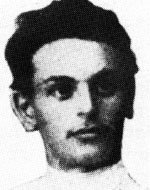Schweiger, Dov (Berla)
Son of Moshe. Born in the Moldawanka suburb of Odessa, Russia. In his youth, during the outbreak of pogroms in Odessa he participated in “self-defense.” In 1905, at the beginning of the Second Aliyah, he immigrated to Eretz Israel and settled in Petah Tikva. He worked in the fields and planted trees, immersed himself in the cultural and social life of the colony’s workers and participated in the newly founded Poalei Zion and Hapo’el Hatza’ir parties. At these meetings he contributed by jokes and insinuations, to relieve the tension that was in them from time to time. In his spare time, he was completely immersed in singing and dancing, and became a focus of gaiety. After the boycott imposed by the farmers of Petah Tikva on the new workers due to their refusal to commit to observing Shabbat and kashrut, Dov became a prank; He disguised himself as an Arab and was accepted for a day’s work. It was a conversation and a laughing-out. When most of the colony’s workers left the settlement because of the boycott, Dov left with them and went to work at the agricultural school in Mikve Israel. He was fired from his job after he was rescued, without the permission of the management, to the aid of the farmers of Gedera when Arabs attacked the settlement. He went to work in Hadera, where he fell ill and after his recovery left for Sejera and joined the Hashomer members. Dov became a guard and a shepherd and his grazing partners were Arab shepherds. They saw the work of the Jewish shepherd as a blow to their livelihood and often provoked him and sought a pretext to harm him, but he thwarted their attempts with the weapon he possessed. In the summer of 1908, a dispute broke out between the Arabs of the area and the village committee in Mascha (Kfar Tavor), and Dov was assigned a mission to organize the defense of the moshava, Mitzpeh near Tiberias and Dov Goyis to work there. One day, when he was walking from Mitzpeh to Sejera, he was attacked by Arab robbers from the village of Lubia. Dov tried to defend himself but the attackers managed to hit him and seriously wounded him. He was rushed to a hospital in Tiberias where he was hospitalized for several weeks. On April 12, 1909, he died and was buried in the cemetery in Tiberias. After a while, his bones were transferred for burial in the guards’ graves in Kfar Giladi. His name was immortalized in Yizkor books, a monument to the fallen workers of the Hebrew workers “Fifty Years of Settlement in the Lower Galilee” in “Hashomer” book, “Dreamers and Warriors” and “Sejera – Toldotia and Ishya”.
